There are over 800 breeds of sheep in the world. These breeds are in various shapes, sizes, types and color. Only a few countries in the world have no sheep. Sheep are found in tropical and temperate countries, artic, in cold and hot climates, in humid and desert areas. The breeds of sheep are classified as Local Breeds of Sheep and Exotic Breed of Sheep. Before going further, let us look at common terminologies in sheep production.
Common Terminologies in Sheep Production
- Flock: A group of sheep
- Ram or Tup: Adult male sheep
- Ewe: Adult female sheep
- Lamb: general name for new-born sheep
- Ram lamb or Tup Lamb: Young male sheep
- Ewe Lamb or Gimmer Lamb: Young female sheep
- Wether or Wedder: Castrated male sheep
- Suckling: Female sheep with her suckling
- Lambing: Act of parturition in sheep
- Tupping: Acts of mating in sheep
- Gestation: Pregnancy
- Bleating: Sound made by sheep
Local Breeds of Sheep
The indigenous or local breeds of sheep in Nigeria are:
- Balami
- Uda
- West African Dwarf (WAD)
- Yankasa
Balami
Balami can be found majorly in Borno State and other areas in North-East Nigeria. This particular sheep breed is big and the coat/skin color is predominantly white. Balami has a convex face; large, droopy earlobes; and a thin, long tail. The ram possesses horns while the ewe doesn’t have horns.
An adult Balami ram could weigh about 40 – 65 kg while an adult Balami ewe weighs about 30 – 45 kg. Balami can survive in dry or arid environments. This breed is known for its potential to produce meat.
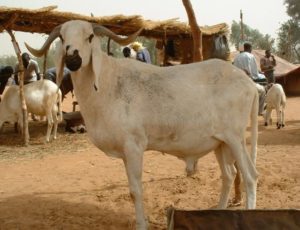
Uda
Uda sheep is predominant in North West Nigeria as well as in the Sahel-Sudan vegetation zone in Nigeria. This breed of sheep has a characteristic coat/skin color pattern. The fore or anterior part of the sheep is brown or black in colour while the rear or posterior part is white in colour. Uda has a convex face; long, large legs; and long, large and pendulous earlobes. Uda rams have horns and these horns become wide, large and spiral as the sheep grow older. Uda ewes don’t have horns.
An adult Uda ram could weigh about 35 – 60 kg while an adult Uda ewe weighs about 30 – 45 kg. The breed is adapted to an extensive type of grazing. Like the Balami breed, Uda sheep can survive in any dry and hot environment. However, they have a low survival rate outside their ecological zone.
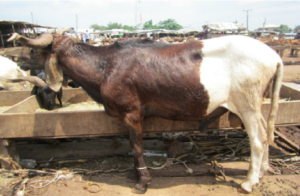
Yankasa
Yankasa breed of sheep is the most common and widely distributed breed in Nigeria. They are predominantly in Northern Nigeria. The coat/skin color is white with dark patches around the muzzle, ears, eyes and feet. The rams also have horns while the ewes don’t have horns. An adult Yankasa ram has white heavy mane at the neck area. An adult Yankasa ram could weigh about 30 – 45 kg while an adult Yankasa ewe weighs about 25 – 40 kg.
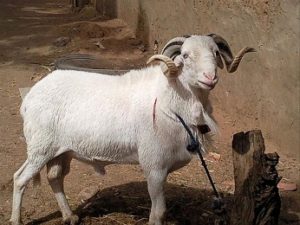
West African Dwarf (WAD) Sheep
West African Dwarf is the sheep breed found in the South and South-Western part of Nigeria. This breed referred to as dwarf because it is small and has short legs. The males have horns while the females are hornless. The skin/coat color varies from all black, all white or brown to spotted brown or black on white skin or coat. WAD sheep are trypano-tolerant and very hardy. An adult WAD ram could weigh about 20 – 30 kg while an adult WAD ewe weighs about 15 – 25 kg.
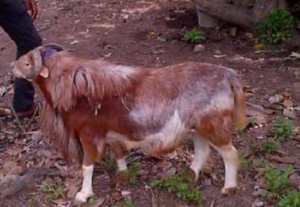
Also Read: The Local & Exotic Breeds of Goat
Exotic Breeds of Sheep
Some exotic breeds of sheep include:
- Merino
- Rambouillet
- Southdown
- Lincoln
- Leicester
- Corriedale
Merino
It is the most popular fine-wool breed in the world. The breed is a native of Spain and has spread throughout the world. Wrinkles or folds in the skin are qualities of this breed. Ewes are polled, while the rams have rather large, heavy, spirally turned horns. The breed is rather small in size, somewhat upstanding angular than rectangular. Merinos are extremely hardy, being able to survive under adverse weather as well as poor grazing condition.
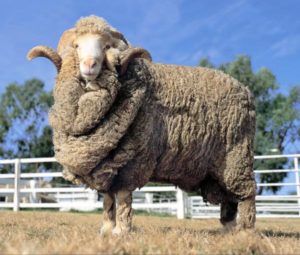
Rambouillet
From Spanish Merino foundations, the French developed a fine wools rain of sheep, the Rambouillet, of much greater size than Merino. It may be considered dual very suitable for range qualities.
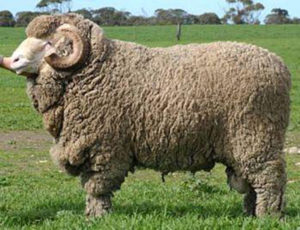
Southdown
These are one of the oldest of the English breeds and have been exported to many countries and used extensively in New Zealand, Australia and U.S.A. The body is small but blocky; the head is distinguished by its “mousey grey face” and short rounded ears. The fleece is of a very high quality and second only to Merino; the length is 50 mm-75 mm with an excellent cript, average fleece weight 2 kg.
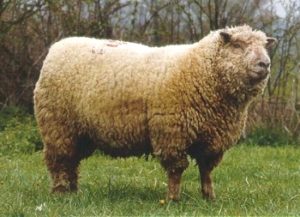
Lincoln
The breed is native to England. It is the largest of the British breeds and mature ram may weigh in excess of 52 kg. The wool is long in the staple, reaching 430 mm to 480 mm, and is very dense and rather coarse; fleece weighs around 4.5 kg to 5.4 kg. Ewes are fairly prolific. Lincolns have been very successfully used in cross-breeding and in developing new breeds. In Australia the Lincoln is used chiefly for crossing with large-framed Merino-ewes, producing a good dual purpose sheep.
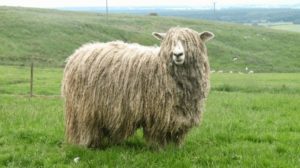
Leicester
The breed is one of purest breeds of British long wools. The breed is not so heavy as Lincolns, the average weight of a mature ram being 100 kg and of a ewe 85 kg. They are early maturing and fatten readily at an early age under good feeding conditions, producing an excellent type of mutton. Wool is dense, free, even, and lustrous; ‘lock medium width, showing small, well-defined wave from the skin to tip. The animals are alert, robust showing style and character. The Border Leicester is generally regarded as a cross between the Cheviot and the Leicester.
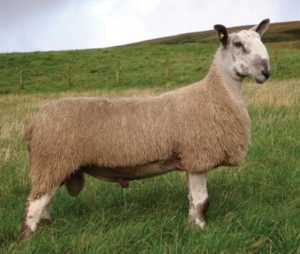
Corriedale
The breed is comparatively new. It is a dual purpose breed combining a high class of mutton with a good class of wool. It cuts an average of about 5 kg of wool. The breed is prolific and hardy. The ancestry of this breed is predominantly Lincoln and Merino with the likely addition of some genetic contribution from the Leicester.
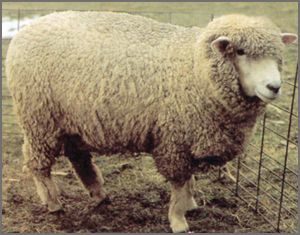
Also Read: How to Control Worms & Flukes Effectively in Sheep, Goats and Cattle
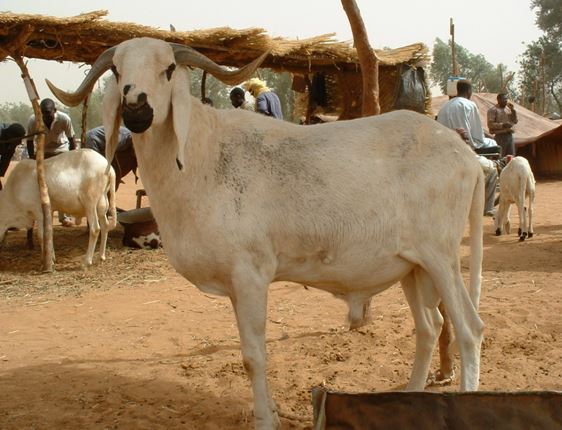
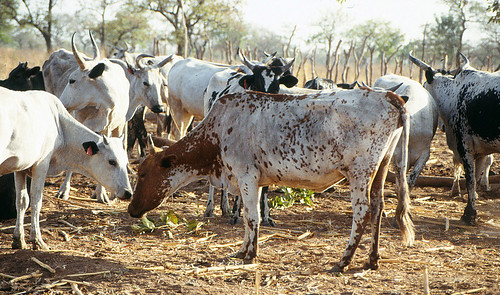
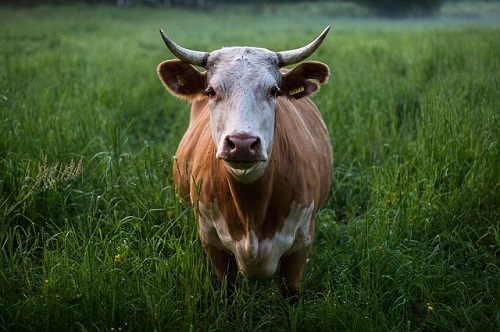
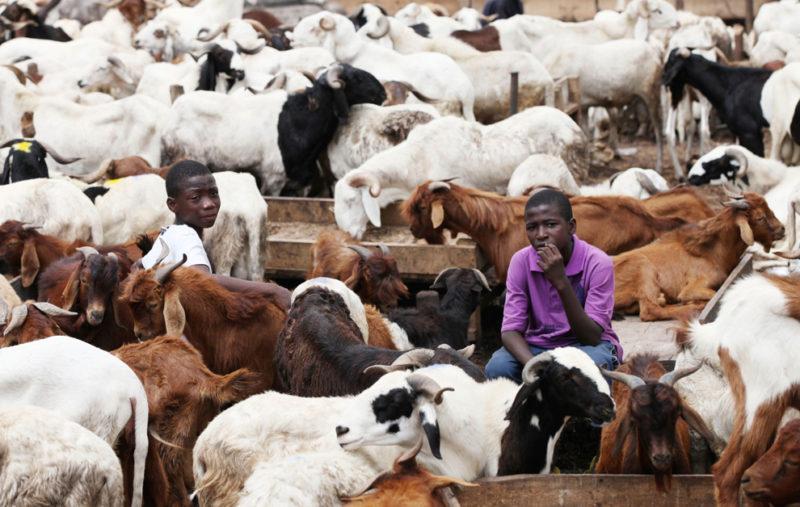
Feed us with more information on livestock
I will. Thanks for commenting
This is very cool and helpful for researchers …keep it kicking
Thanks you Eric
I find your write up interesting, keep it up how ever I will like you to teach me how blog
Whenever you’re ready, contact me Here
Please want to learn ram fattening Mr Akinbobola.need your assistance
Are you willing to pay for my service?
Hello Akinbobola,
I will like to start a ram rearing venture. I live in Abeokuta. I need your expertise or consultancy to help set one up. Alternatively, you can refer me to anyone who can render such services.
Hi,
I will send you an email regarding this. Thanks
Hello Akinbonola,
I wanted to know the profitability and Marketing of Sheep and Goat. I am planning to start Sheep and Goat farming.
Th as nk you